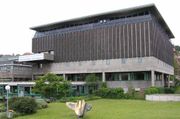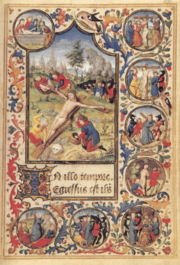
Württembergische Landesbibliothek
Encyclopedia


Library
In a traditional sense, a library is a large collection of books, and can refer to the place in which the collection is housed. Today, the term can refer to any collection, including digital sources, resources, and services...
in Stuttgart
Stuttgart
Stuttgart is the capital of the state of Baden-Württemberg in southern Germany. The sixth-largest city in Germany, Stuttgart has a population of 600,038 while the metropolitan area has a population of 5.3 million ....
, Germany, which traces its history back to the ducal public library of Württemberg
Württemberg
Württemberg , formerly known as Wirtemberg or Wurtemberg, is an area and a former state in southwestern Germany, including parts of the regions Swabia and Franconia....
, founded in 1765. It holds c. 3.4 million volumes and is thus the fourth-largest library in the state of Baden-Württemberg
Baden-Württemberg
Baden-Württemberg is one of the 16 states of Germany. Baden-Württemberg is in the southwestern part of the country to the east of the Upper Rhine, and is the third largest in both area and population of Germany's sixteen states, with an area of and 10.7 million inhabitants...
(after the university libraries of Freiburg, Heidelberg and Tübingen). The WLB owns an important collection of medieval manuscripts as well as one of the largest bible
Bible
The Bible refers to any one of the collections of the primary religious texts of Judaism and Christianity. There is no common version of the Bible, as the individual books , their contents and their order vary among denominations...
collections in the world.
The WLB is one of two state libraries of Baden-Württemberg, the other being the Badische Landesbibliothek (BLB) at Karlsruhe. One of the library's main purposes is to collect and archive written literature from and about the Regierungsbezirk (state subdivision) Tübingen and Regierungsbezirk Stuttgart, i.e. roughly the former land of Württemberg
Württemberg
Württemberg , formerly known as Wirtemberg or Wurtemberg, is an area and a former state in southwestern Germany, including parts of the regions Swabia and Franconia....
. The library is entitled to a legal deposit
Legal deposit
Legal deposit is a legal requirement that a person or group submit copies of their publications to a repository, usually a library. The requirement is mostly limited to books and periodicals. The number of copies varies and can range from one to 19 . Typically, the national library is one of the...
of every work published in Baden-Württemberg (before 1964: in Württemberg).
The WLB has also been part of the Stuttgart University library system since 1967. As an academic library, it is responsible for the humanities sections of the University of Stuttgart
University of Stuttgart
The University of Stuttgart is a university located in Stuttgart, Germany. It was founded in 1829 and is organized in 10 faculties....
as well as for the Stuttgart College of Music and the Stuttgart Academy of Arts.
While the library offers many catalogues online (including a Baden-Württemberg bibliography), it does not yet make its collections available in digitized form at all.
History
The library was founded by Karl Eugen, Duke of WürttembergKarl Eugen, Duke of Württemberg
Charles Eugene , Duke of Württemberg was the eldest son of Duke Karl I Alexander and Princess Maria Augusta of Thurn and Taxis .-Life:...
as a public ducal library (Herzogliche Öffentliche Bibliothek) in Ludwigsburg
Ludwigsburg
Ludwigsburg is a city in Baden-Württemberg, Germany, about north of Stuttgart city centre, near the river Neckar. It is the largest and primary city of the Ludwigsburg urban district with about 87,000 inhabitants...
, then state capital of Württemberg, on the occasion of his 37th birthday on February 11, 1765. The library was relocated to the Stuttgart Herrenhaus in 1777. Karl Eugen acted as the library director until his death, trying to establish one of Germany's leading libraries. To achieve this goal, he merged existing ducal collections with a collection he bought from his first librarian, Joseph Uriot, creating a collection of well over 10,000 volumes. The ducal collections of antiquities and coins were also added to the library collection. Karl Eugen also bought important collections for his library (including the bible collections of preacher Josias Lorck, Copenhagen, and of archdeacon Georg Wolfgang Panzer, Nuremberg). With the right of legal deposit of new books transferred from the government library Bibliothek des Regierungsrats to the new public library and the incorporation of many state-run administration libraries from all over the country, the collections grew quickly. At Karl Eugen's death, the library held 100,000 volumes.
While his successors were not as interested in books as he had been, the library still grew continuously, e. g. by incorporating books from monasteries secularized in 1803. Most of the monasterial collections, however, were given to the Royal Library (Königliche Handbibliothek), founded by King Frederick I
Frederick I of Württemberg
Frederick I William Charles of Württemberg was the first King of Württemberg. He was known for his size: at and about , he was in contrast to Napoleon, who recognized him as King of Württemberg.-Biography:...
in 1810. This old-type court library (since 1886: Königliche Hofbibliothek) was only incorporated to the collections of the public library much later.
In 1820, the library moved to the Invalidenhaus, a former military housing complex in Stuttgart. At nearly the same location, a new building was erected from 1878 to 1886. At this time, the library was renamed Königliche Landesbibliothek (Royal State Library). After the end of the monarchy, the institution was again renamed and gained its current name Württembergische Landesbibliothek.
The library was nearly completely destroyed in World War II
World War II
World War II, or the Second World War , was a global conflict lasting from 1939 to 1945, involving most of the world's nations—including all of the great powers—eventually forming two opposing military alliances: the Allies and the Axis...
. The most valuable items had already been stored at a safe place outside Stuttgart, but approximately half of the collection (over 400,000 volumes) was lost in the fire that followed an air raid
Bombing of Stuttgart in World War II
The bombing of Stuttgart in World War II was a series of 53 air raids that formed part of the strategic air offensive of the Allies against Germany. The first bombing occurred on August 25, 1940 and resulted in the destruction of 17 buildings...
on December 12/13, 1944. The losses included all literature after 1930, many complete thematic sections, many newspapers and magazines and most of the former Court Library. Of the buildings, only an administrative building (containing the catalogs) survived.
After the war, the library tried to fill the gaps in its collection. Regional publishing houses tried to help succeeding this goal by donating large numbers of books to WLB. A new library building, designed by Horst Linde, was opened at the former location on August 3, 1970.
Special collections

- Manuscripts Collection, holding over 15,000 manuscripts. The last major acquisition were 700 manuscripts from the collections of the princely library of DonaueschingenDonaueschingenDonaueschingen is a German town in the Black Forest in the southwest of the federal state of Baden-Württemberg in the Schwarzwald-Baar Kreis. It stands near the confluence of the two sources of the river Danube ....
, funded by the state of Baden-Württemberg. This transaction included the manuscripts of the Zimmern ChronicleZimmern ChronicleThe Zimmern Chronicle is a family chronicle describing the lineage and history of the noble family of Zimmern, based in Meßkirch, Germany. It was written in a Swabian variety of Early New High German by Count Froben Christoph von Zimmern...
and other pre-eminent works of Baden-Württemberg history. - Old and Rare Prints, with over 7,000 incunabula, a small collection of rare book covers, rare books from the 16th to 19th centuries, and remnants from the former Württemberg court library. The incunabula collection is one of the largest in the world.
- Library of Contemporary History, with c. 350,000 volumes from 1914 until today
- Bible Collection, with more than 16,000 printed Bibles, including a Gutenberg BibleGutenberg BibleThe Gutenberg Bible was the first major book printed with a movable type printing press, and marked the start of the "Gutenberg Revolution" and the age of the printed book. Widely praised for its high aesthetic and artistic qualities, the book has an iconic status...
(bought in 1978) and the only complete copy (one of three surviving) of William TyndaleWilliam TyndaleWilliam Tyndale was an English scholar and translator who became a leading figure in Protestant reformism towards the end of his life. He was influenced by the work of Desiderius Erasmus, who made the Greek New Testament available in Europe, and by Martin Luther...
's English Bible. The WLB bible collection is considered by many to be one of the most important in the world, only second to the British LibraryBritish LibraryThe British Library is the national library of the United Kingdom, and is the world's largest library in terms of total number of items. The library is a major research library, holding over 150 million items from every country in the world, in virtually all known languages and in many formats,...
's collection. - Music Collection, including many manuscripts and musical estates
- Map and Prints, holding c. 136,000 maps, c. 120,000 portraits, mainly of regional personalities, and c. 31,500 postcards
- Dance and Ballet Collection, c. 2,700 volumes on the history of dance and ballet
- Hölderlin Archive, including manuscripts and first editions of Friedrich HölderlinFriedrich HölderlinJohann Christian Friedrich Hölderlin was a major German lyric poet, commonly associated with the artistic movement known as Romanticism. Hölderlin was also an important thinker in the development of German Idealism, particularly his early association with and philosophical influence on his...
's works; editor of the International Hölderlin Bibliography - Stefan George Archive, including Stefan GeorgeStefan GeorgeStefan Anton George was a German poet, editor, and translator.-Biography:George was born in Bingen in Germany in 1868. He spent time in Paris, where he was among the writers and artists who attended the Tuesday soireés held by the poet Stéphane Mallarmé. He began to publish poetry in the 1890s,...
's literary estate and editions of his work - Former Library of the State Crafts and Trade Office (Landesgewerbeamt)
Inventory
As of 31 Dec 2005, the library held c. 5 million media, including:- over 3.4 million books
- 15,261 manuscripts
- 7,076 incunabula
- 180,049 autographs
- 415,569 microfiches and microfilms
- 136,458 maps and atlases
- 31,500 postcards
- 158,668 pamphlets
- 568,613 photographs
- 88,348 military mail letters
- 64,500 volumes of sheet music
- 26,391 sound recordings
- several electronic databases
External links
- WLB Homepage (with an English menu, but most content only available in German)

